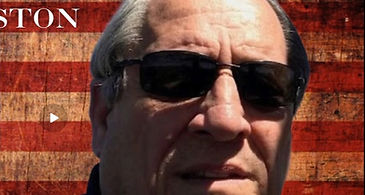New Illinois Campaign Wants To Split State: ‘This Is Not Secession’
- PAUL PRESTONxd

- Oct 24, 2025
- 8 min read
Published
Oct 18, 2025 at 05:00 PM EDT
updated
Oct 21, 2025 at 03:26 AM EDT
0:37 / 0:54

By Martha McHardy
US News Reporter
In small towns and farm communities across Illinois, a quiet rebellion is taking shape. Frustrated by what they see as decades of corruption, crime, and one-party dominance from Chicago, a growing number of residents are rallying behind a campaign to carve out a brand-new state—New Illinois.
Led by G.H. Merritt, the group says its goal isn’t to leave the Union, but to escape what they call political neglect from the state’s urban power base.
“This is not secession,” Merritt insisted. “Secession is when the southern states just up and left the Union. What we’re doing is legal and constitutional—we need the consent of our legislature and of Congress. We don’t identify with the Confederacy. That was a racist movement, and that’s not what we are.”
Ultimately, Merritt said, the mission is about representation, not division.
“We’re not trying to divide the country,” she told Newsweek. “We’re trying to fix what’s broken—to create a government that truly represents the people of downstate Illinois.”
'We Just Want Representation'
Illinois as a whole is broadly considered a Democratic stronghold in national and statewide politics. Democrats currently hold every statewide executive office and both chambers of the state legislature. In presidential elections, Illinois has voted Democratic consistently in recent cycles. In the 2024 presidential election, Chicago cast 78.3 percent of its vote for the Democratic candidate, while 20.6 percent went Republican.
However, that statewide Democratic dominance masks stark internal divisions. Large portions of downstate Illinois tend to lean strongly Republican, winning the majority of counties in many elections, even if they lose the statewide tally. Yet, because Chicago and its surrounding metro area (especially Cook County) are densely populated and heavily Democratic, they often determine the outcome of statewide contests.
For Merritt, this is a big problem.
“We just want representation,” she told Newsweek. “Once the people of New Illinois are able to elect leaders who represent them, we trust them to decide what kind of state they want to live in.”
A Constitutional Case for Statehood
“New Illinois is a nonprofit organization that educates Illinois citizens about their right to pursue the creation of new state from the State of Illinois. We are seeking a state split, following the process provided in the U.S. Constitution (Article IV, Sec. 3). This is the same way that West Virginia split from Virginia,” the campaign says on its website.
Organizers say they are addressing a deep cultural and economic divide within Illinois.
“We are addressing the longstanding divide in the State of Illinois. This divide is not between Democrats and Republicans—it is urban vs. rural, small town and suburban. We are two very different places, both culturally and economically. Legislation and policies addressing the needs and best interests of a major urban area like Chicago/Cook County are not necessarily in the best interests of the rest of the state,” the website adds.
The group’s literature points to the U.S. Constitution as both their road map and justification.
“There’s something called the Guarantee Clause that states have a republican form of government, and that's small r Republican—government of the people, by the people and for the people.”

A quiet rebellion is taking shape in Illinois, where a growing number of residents are rallying behind a campaign to carve out a brand-new state—| Getty Images
'A Logical Step Forward'
Merritt said the group’s movement is rooted in the belief that a state split is the only way to restore accountability and local control.
“This is the only way that we think is a logical step forward to regain our constitutional rights,” she said.
She argued that Illinois’ political imbalance began decades ago with the 1964 Supreme Court Reynolds v. Sims decision.
Reynolds v. Sims was a U.S. Supreme Court case that required state legislative districts to be based on population, establishing the principle of “one person, one vote.” The Court ruled that unequal representation violated the Equal Protection Clause of the Fourteenth Amendment and that all citizens’ votes should carry roughly equal weight. The decision forced many states, including Illinois, to redraw their legislative maps, giving more power to urban areas like Chicago and reducing the influence of rural regions. While it was meant to ensure fairness, critics say it shifted political control toward cities and widened the divide between urban and rural parts of the state.
“When you apply Reynolds v. Sims to a state like Illinois that was already known for corruption and a city like Chicago that already had a corrupt political machine, the power gets sucked into one place,” Merritt said. “You no longer have accountability, and when you don’t have accountability, corruption increases.”
The group has floated ideas such as tying legislators’ pay to the state’s median income to “reduce corruption by linking lawmakers’ earnings to the people they represent.”
Economic Strain and Public Safety Concerns
Merritt said Illinois' financial troubles and sanctuary policies have deepened the sense of alienation felt outside Chicago.
“Illinois becoming a sanctuary state…I think it’s something like 300,000 people are here now who are not here legally,” she said. “It’s one thing if you’re a state running a big surplus—you can afford to spend money like that—but our state is on the verge of insolvency.”
New Illinois’ mission statement describes the state as facing “a financial crisis brought on by corruption,” with politicians “unwilling or unable (by virtue of the Pension Protection Clause of the Illinois Constitution) to stop and address the coming implosion.”
Merritt also cited rising fears over public safety in Chicago.
“We have a city now where a lot of people that don’t live in the city don’t go to the city anymore because it’s dangerous,” she said. “You can be driving your car on the freeway and get shot.”
Her comments come as President Donald Trump’s recent attempt to deploy roughly 500 National Guard troops to the Chicago area reignited debate over the city’s crime and immigration crises. The White House said the troops were intended to “protect U.S. government personnel and property,” but Illinois Governor JB Pritzker and Chicago Mayor Brandon Johnson condemned the move as an overreach of federal power. A federal judge temporarily blocked the deployment, warning that it could “add fuel to the fire,” though an appeals court later allowed the troops to remain stationed in Illinois without active deployment.
Despite Merritt’s warning, official data show that violent crime in Chicago has been falling. Homicides were down about 33 percent and shootings down 38 percent in the first half of 2025 compared with 2024.
Nonetheless, migration has become a flash point. Since Texas began busing asylum-seekers to Chicago in 2022, the city has taken in tens of thousands of new arrivals—many of them Venezuelans. Arrests among migrants have increased, though most involve minor offenses such as traffic violations or theft. Data compiled by the Fairness and Accuracy in Reporting project found that arrests of Venezuelan-born residents rose from 6 in 2021 to 686 by late 2023.
But researchers consistently find no link between immigration and violent crime rates. A study published by the American Immigration Council found that immigrants—including undocumented ones—commit crimes at the same or lower rates than native-born residents.
'Taxation Without Representation'
The New Illinois campaign is one of two major movements calling for political separation from Chicago and Cook County. Another, the Illinois Separation Referendum, has been organizing local ballot measures across rural counties.
The movement, which organizers say has now spread through dozens of rural counties, frames itself as a modern response to “taxation without representation.” Supporters argue that downstate residents have been politically sidelined for decades—victims of a system that concentrates power and money in Chicago while rural communities struggle with job losses, rising taxes, and shrinking populations.
Loret Newlin, the group’s director, told Newsweek frustration with the current system runs deep.
“If we don’t get out from under their control, I don’t see how the people in downstate will survive,” she said. “Separation would resolve the polarized climate. The reason the state is so divided is because so many of us are living under ‘taxation without representation.’”
Is a New State Realistic?
But a question remains as to how separation can actually be achieved. Under Article IV, Section 3 of the U.S. Constitution, any new state must have the consent of both the state legislature and Congress—a high bar that no modern movement has cleared. Merritt acknowledged that reality but said momentum is building.
“We have about 13 people in our state legislature who openly support New Illinois, and I haven't talked to everybody in the legislature, so I'm assuming that there are more.”
Meanwhile, according to Newlin, about 74 percent of voters in the 33 counties that have so far held votes support the referendum proposal, but she said there could still be a long road ahead.
“It took Maine 38 years to separate…so we need to be prepared for the long route, and be happily surprised if it happens sooner,” she said.Maine formally seceded from Massachusetts on March 15, 1820.
There has already been some progress toward shifting the boundaries of the state of Illinois. The Indiana-Illinois Boundary Adjustment Commission was established in July this year under Indiana House Bill 1008 to explore the possibility of adjusting the boundary between Indiana and Illinois and redrawing state lines to incorporate 33 Illinois counties into Indiana.
However, the commission’s role is not to enact boundary changes, but rather to “discuss and recommend” whether redrawing the border is advisable, and then to submit a report to Indiana’s legislature. And the commission’s mandate faces several serious constraints. First, the Illinois legislature has not passed a companion bill authorizing Illinois’ participation, meaning Illinois’ appointed members may not be in place. Second, any actual change in state boundaries would require the consent of both state legislatures (Indiana’s and Illinois’) and Congress, according to the U.S. Constitution (Article IV, Section 3). In the absence of those approvals, the commission can only make nonbinding recommendations.
Critics and some officials in Illinois have dismissed the commission as more symbolic than substantive. Governor Pritzker has called Indiana’s effort a “stunt” and suggested it is unlikely to lead to actual boundary changes.
Indiana House Democratic Leader Phil GiaQuinta has dismissed the notion of adopting Illinois counties as financially reckless.
“It would be fiscally irresponsible to willingly take on more citizens right now when our state budget is struggling to stay afloat. These counties didn't ask to be adopted by Indiana, and we simply do not have the capacity to serve more people.” he told Newsweek.
By contrast, Speaker of the Indiana House of Representatives Todd Huston emphasized the state’s strong fiscal record, but steered clear of endorsing the idea of absorbing Illinois counties.
“I look forward to continuing to tell Indiana's story and share why the Hoosier state is a great place to live, work, start and grow a business, and raise a family. Indiana recently earned a AAA credit rating for the 16th consecutive year for our strong fiscal outlook," he said. "We're continuing to see positive education gains for our students, our economy is growing and people are choosing to move to our state.”
New Illinois believes an independent downstate Illinois could thrive economically.
“People's biggest concern is, is this an economically feasible thing to split the state? We are working with some wonderful financial experts…we are confident that split off from Chicago, not only would new Illinois do better financially, but perhaps Chicago would as well,” Merritt said.
Correction
Correction 10/21/25, 3:08 a.m. ET: This article has been updated to reflect that the Reynolds v. Sims Supreme Court decision was in 1964, not 1946.

















Comments